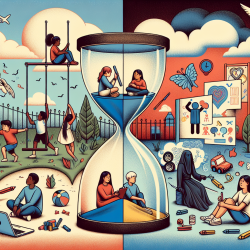As practitioners dedicated to fostering positive outcomes for children, we constantly seek data-driven insights to refine our approaches. A recent study titled "Relationships between psychosocial outcomes in adolescents who are obese and their parents during a multi-disciplinary family-based healthy lifestyle intervention: One-year follow-up of a waitlist controlled trial" from Curtin University offers valuable findings that can enhance our practice. This blog explores how these findings can be applied to improve our interventions and encourages further research.
Key Findings
The study assessed the psychosocial outcomes of adolescents and their parents participating in the Curtin University’s Activity, Food, and Attitudes Program (CAFAP). The intervention was community-centered and delivered by multi-disciplinary teams. Key findings include:
- Significant correlations between adolescent and parent psychosocial outcomes across the one-year follow-up.
- Improvements in adolescent depression, quality of life, and family functioning maintained up to one year post-intervention.
- Reductions in parent symptoms of depression, anxiety, and stress, primarily sustained during the waitlist period.
- Adolescent psychosocial improvements partially associated with behavioral changes but independent of physical changes.
Implications for Practice
Based on these findings, practitioners can implement several strategies to enhance the effectiveness of family-based interventions:
- Incorporate Parental Support: Addressing the psychosocial needs of parents is crucial. Their mental health significantly influences adolescent outcomes.
- Focus on Psychosocial Outcomes: While behavioral and physical changes are important, targeting psychosocial outcomes directly can yield significant benefits.
- Monitor Family Dynamics: Family functioning may experience non-linear changes. Providing continuous support and psychoeducation can help families navigate these challenges.
- Leverage Positive Expectations: The anticipation of support can positively impact psychosocial outcomes. Building a sense of hope and expectation can enhance intervention effectiveness.
Encouraging Further Research
The study highlights the importance of considering both adolescent and parent outcomes in interventions. However, it also opens avenues for further research:
- Investigate the bi-directional relationship between adolescent and parent psychosocial outcomes.
- Examine the long-term sustainability of psychosocial improvements beyond one year.
- Explore the mediation effects between psychosocial, behavioral, and physical changes.
To read the original research paper, please follow this link: Relationships between psychosocial outcomes in adolescents who are obese and their parents during a multi-disciplinary family-based healthy lifestyle intervention: One-year follow-up of a waitlist controlled trial (Curtin University’s Activity, Food and Attitudes Program).










